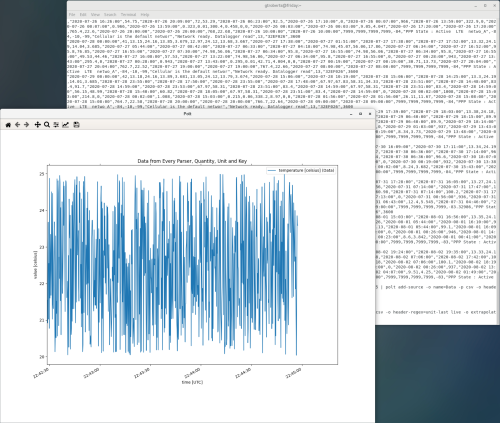
Overview
LoggerNet Linux/U allows customers with earlier versions of LoggerNet Linux to upgrade to the latest version of LoggerNet Linux. Learn more about its capabilities on the LoggerNet Linux product page.
Note: LoggerNet Linux/U requires LoggerNet Remote/U, which is available in the Ordering information section.
Benefits and Features
- Upgrade from older version to current version for a discounted price
Images

Compatibility
Note: The following shows notable compatibility information. It is not a comprehensive list of all compatible or incompatible products.
Data Loggers
| Product | Compatible | Note |
|---|---|---|
| 21X (retired) | The 21X requires three PROMs; two PROM 21X Microloggers are not compatible. | |
| CR10 (retired) | ||
| CR1000 (retired) | ||
| CR1000X (retired) | ||
| CR10X (retired) | LNLINUX is compatible with the mixed array, PakBus®, and TD operating systems. | |
| CR200X (retired) | ||
| CR206X (retired) | ||
| CR211X (retired) | ||
| CR216X (retired) | ||
| CR23X (retired) | LNLINUX is compatible with the mixed array, PakBus®, and TD operating systems. | |
| CR295X (retired) | ||
| CR300 (retired) | ||
| CR3000 (retired) | ||
| CR310 | ||
| CR350 | ||
| CR500 (retired) | ||
| CR5000 (retired) | ||
| CR510 (retired) | LNLINUX is compatible with the mixed array, PakBus®, and TD operating systems. | |
| CR6 | ||
| CR800 (retired) | ||
| CR850 (retired) | ||
| CR9000 (retired) | ||
| CR9000X (retired) |
Additional Compatibility Information
Computer
The disk with the LoggerNet Linux Server contains a Debian distribution and a Red Hat RPM distribution. Each distribution includes a 64-bit version.
LoggerNet Remote is required for use with LoggerNet Linux. The LoggerNet Remote Clients used to manage the LoggerNet Linux server run on an Intel-based computer with a Microsoft Windows operating system. The LoggerNet Remote Clients run on Windows 10 and 11.
Communications
The LoggerNet server provides communications with the data loggers over various mediums including serial ports, TCP/IP connections, and Linux compatible phone modems.
Specifications
| Operating System | Windows 11 or 10 (for LoggerNet Remote) |
| RPM Distribution | Red Hat (64 bit) |
| Debian Distribution | 64 bit |
Documents
Frequently Asked Questions
Number of FAQs related to LoggerNet Linux Upgrade: 2
-
LoggerNet for Linux should run on most distributions with base distributions of Red Hat or Debian.
-
The blog article "How to Navigate the World of Software Upgrades, Patches, and Trials" explains the difference between patches (free of charge) and upgrades (for a fee). This example quickly shows the difference between an upgrade and a patch:
Upgrade Patch Major version change, such as 1.3 to 2.0
Minor version change, such as 1.3 to 1.4
Typically requires purchase for a fee
Free of charge
Listed Under
Privacy Policy Update
We've updated our privacy policy. Learn More
Cookie Consent
Update your cookie preferences. Update Cookie Preferences

